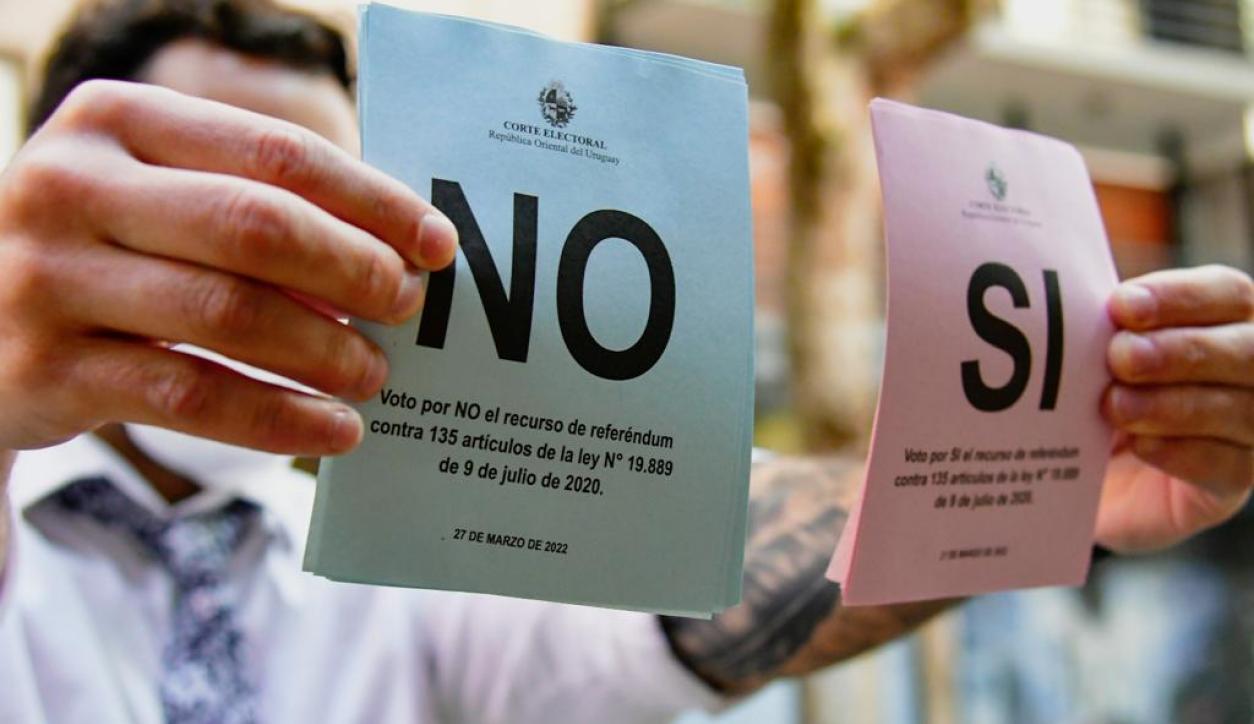RIO DE JANEIRO, BRAZIL – With events, surveys, accusations, and polemic declarations, Uruguay enters the final stretch towards the referendum of March 27 against 135 of the 476 articles of the Law of Urgent Consideration (LUC), the star project of the Executive headed by the center-right Luis Lacalle Pou.
This referendum, which analysts see as a consultation on the support or rejection of the president’s administration in the first two years of his term of office (2020-2025), assesses articles dealing with security, public enterprises, education, or housing, among other aspects.
In pink, the promoters of the ‘Yes’ campaign are pushing to leave without effect that portion of the articles which, they understand, include norms against the popular sentiment.

Supporting this side are the trade union PIT-CNT and the Frente Amplio (FA), a left-wing coalition that governed Uruguay between 2005 and 2020 and is today the main opposition force, in addition to other social organizations which for months promoted the collection of signatures for a referendum.
On the other side are the coalition members that have been governing the country since March 1, 2020. Identified with the light blue color, in a decision of the Electoral Court much criticized at the beginning of this campaign for being the color that identifies the whole country, they are betting for the ‘No’ because they value that the LUC has benefited the citizenship.
In the last hours, their opposing ideas have been highlighted with intense exchanges of words in a polemic tone that has little to do with the usual calm that Uruguayan politics usually offers.
The campaign for the two options will continue until the end of the week, especially in the country’s interior, where, according to experts, most of the undecided are.
However, in the last few days, there were large events aimed at the masses in the capital, Montevideo, where 1.5 of the country’s 3.5 million inhabitants are concentrated.
This Thursday, the ‘No’ closed its campaign in Montevideo with a rally in which the country’s vice-president, Beatríz Argimón, was one of the speakers. On Saturday night, the ‘Yes’ organized an event that combined the political rally with musical performances.
For this last week, big hits are expected to try to convince those who have not yet decided their vote.
In another of the great controversies of this campaign, Lacalle Pou will give voice to the defense of the law he promoted and which was enacted in July 2020. Even though the president cannot proselytize for political parties in Uruguay, no rule prevents him from arguing in favor of a legislative project he promoted.
In the face of the ‘Yes’ supporters, who will broadcast their 7-minute message on national radio and television on Tuesday, March 22, the president will hold a press conference at the Executive Tower a day later, even though he initially used the phrase “no cheating” when asked if he would speak after his opponents.
Because of the escalation of messages, in the last few days, the head of state and the president of the FA, the former unionist Fernando Pereira, had a telephone conversation in which they agreed to maintain a climate of respect.
This Friday, the company Factum presented its last poll before the instance to be held next Sunday, and its results showed that up to now 41% of the population eligible to vote would vote for the ‘No’ option, while 36% would be inclined to vote ‘Yes’.
Meanwhile, 19% of those surveyed have not yet made a firm decision, although, upon further analysis, 7% indicated that they would move towards the ‘No’ option and 6% towards the ‘Yes’ option.
Next Sunday’s referendum will be the fourth nationwide referendum since the Constitution enables this type of consultation to repeal an enacted law.
The previous ones were held in 1989, 1992, and 2003 and in the last two the ‘Yes’ won. The only repeal that was not approved was that of the Law of Expiry of the Punitive Claims of the State.
With information from EFE

